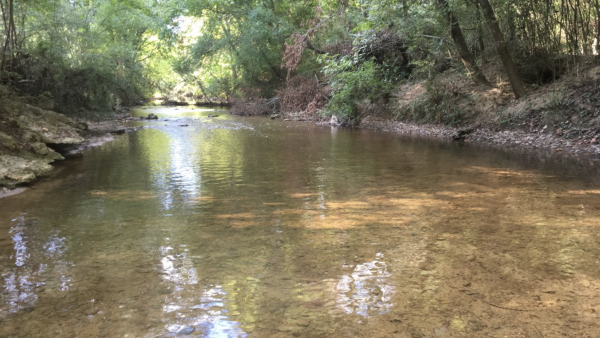Trump’s EPA Seeks to Remove Much of Nation’s Headwaters and Wetlands From Protection

By Hank Black
President Trump moved yesterday to weaken the federal Clean Water Act by redefining the Obama administration’s Waters of the US rule, known as WOTUS, to eliminate protections for much of the nation’s waterways – a majority, in some estimates.
The action principally would remove oversight for small tributary headwaters that do not flow year-round and for wetlands not clearly connected to flowing streams.
The proposed new rule by the Environmental Protection Agency is expected to be challenged and eventually work its way to the U.S. Supreme Court, where a conservative majority now sits.
The proposal is seen as a boon to the president’s rural base. In Alabama, business development and agricultural interests such as the Business Council of Alabama and Alabama Farmers Federation have supported the move, largely on the basis of property owners’ right to use their land as they see fit without subjecting farming and forestry practices to permits and large fines.
U.S. Rep. Terri Sewell, the only Democrat in Alabama’s congressional delegation, said she believed changes were needed to Obama’s rule but that she viewed the move by Trump as “misguided.”
“This Administration’s attempt to remove protections for thousands of miles of US waterways and wetlands puts our environment and our natural resources at risk,” Sewell said in an email. “While I believe that Obama’s Waters of the United States rule was not perfect, and that changes were needed to protect the work of our farmers, the Trump Administration’s elimination of environmental safeguards is misguided. In Congress, I will continue to be a voice for defending the environment while also protecting the work of Alabama farmers.”
Environmentalists in the state have long opposed changing the Obama version, saying it would endanger much of Alabama’s 132,000 miles of waterways, large and small, that provide drinking water, recreation, wildlife protection and crop irrigation.
The Alabama Rivers Alliance, an organization of water-protection groups, slammed the proposal. Policy director Curt Chaffin called the proposal the “dirty water rule” and said it “will make it easier to pollute those important headwaters.”
Birmingham Water Works Board official Darryl R. Jones has gone on record as saying the Obama rule keeps “pollution out of smaller streams that go into larger ones that we get water from for treatment. The less contamination in the source water, the less (treatment) we need to do to get clean, healthy drinking water… We’re at the mercy of what somebody does upstream.”
Jones is assistant general manager of operations and technical services for the Birmingham Water Works Board.
The Southern Environmental Law Center and others have won cases in recent months to delay the proposed rule, and the SELC vowed to continue to oppose it in court. In a statement, the SELC said the rule would be a “giveaway to polluters.”
SELC attorney Blan Holman said the proposal would give a “free pass to dump” and would be “a full-frontal assault on one of our country’s most important and longstanding environmental safeguards.”
He estimated that more than 60 percent of stream miles would cease to be protected from agricultural fertilizer that finds its way into small streams and wetlands well as sedimentation from road and big-development construction.
Without protection, Holman said, industrial operations, sewage treatment facilities and others “may be able to directly dump into these waterways without any public notice, threatening drinking water supplies and harming families and communities.”
Environmental groups urged people to object to the new rule before it becomes final. “If citizens care about clean drinking water or recreation here in Alabama, they must tell the EPA to reject the proposal,” Chaffin, of the Alabama Rivers Alliance, said.
40 years after ‘Purple Rain,’ Prince’s band remembers how the movie came together
Before social media, the film Purple Rain gave audiences a peak into Prince’s musical life. Band members say the true genesis of the title song was much less combative than the version presented in the film.
Park Fire in California could continue growing exponentially, Cal Fire officer says
Cal Fire has confirmed that over a hundred structures have been damaged in the Park Fire, which grew overnight near Chico, Calif. Difficult firefighting conditions are forecast through Friday night.
Checking in with Black voters in Georgia about the election, now that Biden is out
Some voters who could be key to deciding who wins Georgia. What do they think about Vice President Harris becoming the frontrunner in the race to be the Democratic nominee?
Tahiti’s waves are a matter of ‘life and death’ for surfing Olympics
Tahiti's Teahupo'o wave has a slew of riders for the Paris 2024 Olympics. NPR finds out why it's called one of the most dangerous waves.
Researchers are revising botanical names to address troubling connotations
Since the mid-1700s, researchers have classified life with scientific names. But some of them have problematic histories and connotations. The botanical community is trying to tackle this issue.
A spectacular opening ceremony wowed a global audience despite Paris’ on-and-off rain
The Paris Olympics opening ceremony wowed Parisians, fans and most everyone who was able to catch a glimpse of thousands of athletes floating down the Seine to officially begin the Games.



